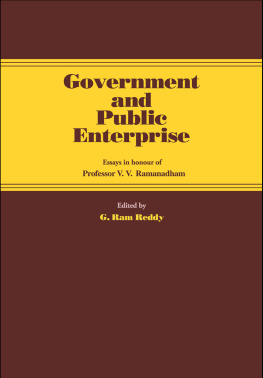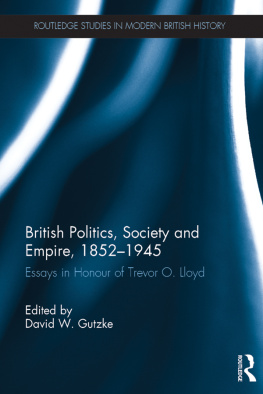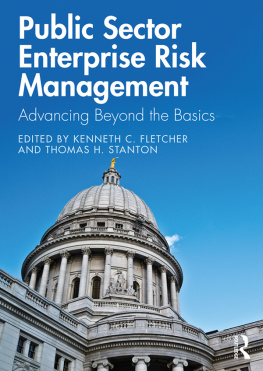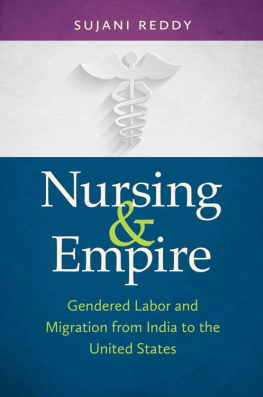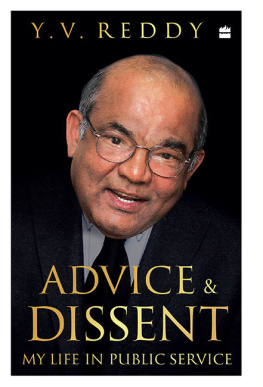GOVERNMENT AND
PUBLIC ENTERPRISE
Essays in honour of Professor
V.V.Ramanadham
Edited by
G.RAM REDDY
Vice-chancellor, Open University, Hyderabad, India
First Published 1983 in Great Britain by
FRANK CASS AND COMPANY LIMITED
Gainsborough House, 11 Gainsborough Road
London, E11 1RS, England
This edition published in the Taylor & Francis e-Library, 2005.
To purchase your own copy of this or any of Taylor & Francis or Routledges collection of thousands of eBooks please go to www.eBookstore.tandf.co.uk.
and in the United States of America by
FRANK CASS AND COMPANY LIMITED
c/o Biblio Distribution Centre
81 Adams Drive, P.O. Box 327, Totowa, N.J. 07511
and in India by
N.M.TRIPATHI PRIVATE LIMITED
164, Samaldas Gandhi Marg, Bombay 400 002
Copyright 1983 V.V.RAMANADHAM
British Library Cataloguing in Publication Data Government and public enterprise: essays in honour of Professor V.V.Ramanadham 1. Government business enterpriseAddresses, essays, lectures
I. Reddy, G.Ram II. Ramanadham, V.V.
338.6 HD3842
ISBN 0-203-98877-9 Master e-book ISBN
ISBN 0-7146-3258-9 (Print Edition)
ISBN 978-1-13577-967-2 (epub)
All rights reserved. No part of this publication may be reproduced, stored in a retrieval system, or transmitted in any form, or by any means, electronic, mechanical, photocopying, recording or otherwise, without the prior permission of the Publishers.
Affectionately presented
to
Professor V.V.Ramanadham
Preface
The idea of producing a volume in honour of Professor V.V. Ramanadham, one of the earliest researchers on public enterprise, emerged from an informal exchange of views among several persons in different countries, who are interested in this subject and closely acquainted with him. The theme of the volume suggested itself fairly easily, for a major determinant of the efficiency of public enterprise lies in how the governments relationships with it manifest themselves.
An effort has been made to invite papers on different aspects of the theme from authors well known for their expertise on public enterprise. The first part, by and large, focusses on the major aspects of the problem and the second on regional experiences in both developed and developing countries.
In the opening paper, Professor Maurice R.Garner makes a broad statement on the complexities of the problem of government-public enterprise relationships. Mr. A.Premchand examines the public exchequer aspects of public enterprise operations. Professor David Chambers focusses on corporate planning which has received special emphasis in recent times and looks at its role in setting the government-public enterprise interface. Professor William Glade reviews the emerging trends of privatisation in public enterprise. Professors Leroy P.Jones and Gustav Papenek enunciate certain policy conditions that can be conducive to the promotion of efficiency in public enterprise. And Dr. Martin J.Boodhoo looks at the place of an appropriate management information system in streamlining the concerns of the government and public enterprise towards each other.
The second part begins with Professor John B.Heaths review of the rather far-reaching, if complex, developments that have been taking place in the United Kingdom, where large-scale nationalisation measures took place in the forties. Professor Ivan Turk throws light on the public approach to performance indicators in the case of the enterprises in Yugoslavia. Dr. Horacio Boneo documents the experience of several Latin American countries in governmental control of public enterprises. Similar and in greater detail is Professor Yash Ghais analysis of African experience. Dr. Robert Floyd provides a richly empirical analysis of government policies towards, and control of, public enterprises in the small-island economy of Papua New Guinea. Dr. Tan Chwee Huat gives an interesting account of how the government acts towards what, in many cases, constitute mixed enterprises in the high-growth-oriented Singapore. Professor Laxmi Narain discusses the experience of India, with its large and diversified public enterprise sector, in a specific segment of the public, viz., Parliaments, interface with it.
Part three provides a concluding review inspired by the two parts. It tries to bring out some commonalities and contrasts and draws broad observations of policy interest in the light of the analyses and the regional experiences contained in the earlier parts.
A brief note is included on the academic contributions of Professor Ramanadham over nearly four decades, which have had a direct or indirect seminal influence on academics in India (of whom several occupy professorial chairs today) and have also attracted significant attention of researchers and policy makers in many other countriesparticularly in the third world.
The response I received from the contributors, who have all distinguished themselves in academic work and policy formulation in the field of public enterprise, reflects not only their cordiality to me but also their friendliness and regard for Professor Ramanadham whom all of them have known for many years and with whom most of them have been associated in the context of some academic activity or other. I offer my grateful thanks to them and, in particular, to Professor Maurice R.Garner whose substantive help in shaping the material for this volume has been as meticulous as it has been generous. I express the hope that the volume will prove useful to those interested in understanding the intricacies of public enterprise as an institution and of the determinants of its efficiency, and that it will constitute a tribute to Professor Ramanadham to whom it is affectionately presented. All of us sincerely convey our good wishes to him on his full-time reversion to academic pursuits at the invitation of the London Business School, after a long tour of service in the United Nations, which closely drew him to the core of the socio-economic problems of many developing countriesespecially in the context of public enterprise as an instrument of progress. And we look forward to his further contributions on the subject.
G.RAM REDDY
Hyderabad
October 1983
A Tribute to Professor Ramanadham
In Willy Brandts introduction to the Report of his Commission on International Development Issues (the famed North-South Report), there appears the remark that the new generations of the world need not only economic solutions, they need ideas to inspire them, hopes to encourage them, and first steps to implement them. They need a belief in man, in human dignity, in basic human rights; a belief in the values of justice, freedom, peace, mutual respect, in love and generosity, in reason rather than force. With the holding of such humane and civilised beliefs, so greatly needed in the world today, but not so greatly found, but of which he is a very embodiment, V.V.Ramanadham combines a profound knowledge of the theory and practice of public enterprise. For all concerned about the future of the developing countries, it must therefore be a matter for regret that he is leaving the U.N. administration. But developments loss is scholarships gain. At the London Graduate School of Business Studies he will have the time and facilities to put to good use his exceptional knowledgepossibly, even, unique knowledgeof public enterprises in so many different countries, his practical experience in the direction of public enterprises in India, and his grasp on the problems of public enterprise acquired from past teaching and research.



